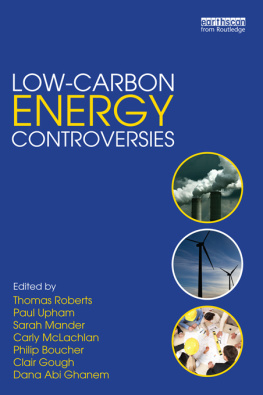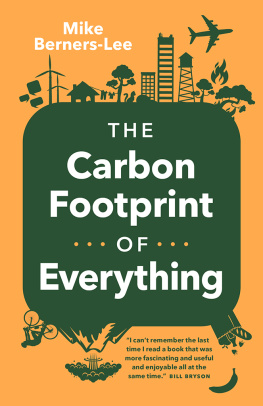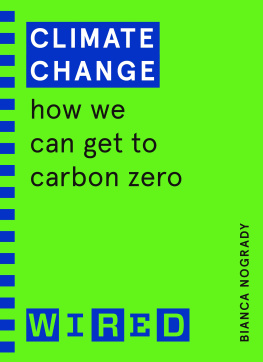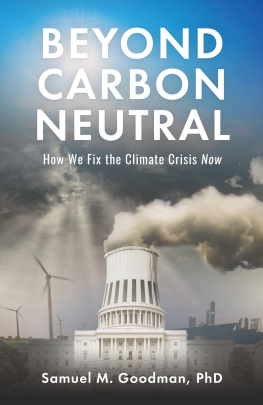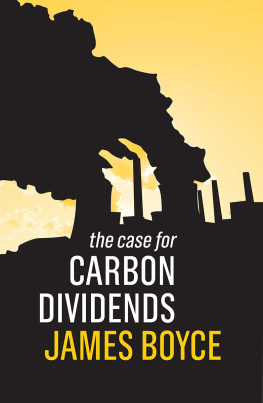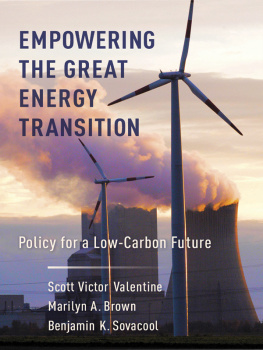Low-Carbon Energy Controversies
The deployment of low-carbon energy supply technologies worldwide has sparked a debate about how to balance local environmental protection and our need for reliable low-carbon energy.
Bringing together ten years of research conducted by the Tyndall Centre for Climate Change Research, this book uses a range of low-carbon energy technology case studies to explore the complex nature of disputes between a wide range of stakeholder groups.
Topics covered include:
the importance of context
the relationship between risk and trust
sense of place
role of the media.
An invaluable resource for academics, students, policy makers and stakeholders in local or national government, industry or community groups who wish to deepen their understanding of controversy around low-carbon technology, and how to overcome it.
Thomas Roberts is a Research Associate at the Durrell Institute of Conservation and Ecology, School of Anthropology and Conservation, University of Kent. His is also a visiting Research Fellow at Tyndall Manchester.
Paul Upham is a Senior Research Fellow at the Centre for Integrated Energy Research and Sustainability Research Institute, University of Leeds. He is also Visiting Professor in Governance of Energy Systems and Climate Change at the Finnish Environment Institute, Helsinki, and an affiliate of the Tyndall Centre for Climate Change Research.
Sarah Mander is a Research Fellow with Tyndall Manchester at the University of Manchester, and co-leader of the People and Governance theme within the national Tyndall Centre for Climate Change Research.
Carly McLachlan is a Lecturer in Climate Change and Project Management at the University of Manchester. She is the Associate Director of Tyndall Manchester and a Sustainable Consumption Institute Research Fellow.
Philip Boucher is a Research Fellow at the Manchester Institute of Innovation Research, where he is pursuing his interests in theoretical and methodological frameworks to support the analysis of controversial lowcarbon energy technologies.
Clair Gough is a Research Fellow with Tyndall Manchester at the University of Manchester, where she contributes to the Energy research theme.
Dana Abi Ghanem is a Research Fellow at Tyndall Manchester and the Sustainable Consumption Institute. She is working on the social process of technology adoption, particularly active demand-side management technologies in households.
Low-Carbon Energy Controversies
Edited by Thomas Roberts,
Paul Upham, Sarah Mander,
Carly McLachlan, Philip Boucher,
Clair Gough, Dana Abi Ghanem
First published 2013
by Routledge
2 Park Square, Milton Park, Abingdon, Oxon OX14 4RN
Simultaneously published in the USA and Canada
by Routledge
711 Third Avenue, New York, NY 10017
Routledge is an imprint of the Taylor & Francis Group, an informa business
2013 Thomas Roberts, Paul Upham, Sarah Mander, Carly
McLachlan, Clair Gough, Philip Boucher, Dana Abi Ghanem
The right of Thomas Roberts, Paul Upham, Carly McLachlan, Sarah Mander, Clair Gough, Philip Boucher and Dana Abi Ghanem to be identified as authors of the editorial material, and of the individual authors as authors of their contributions, has been asserted in accordance with sections 77 and 78 of the Copyright, Designs and Patents Act 1988
All rights reserved. The purchase of this copyright material confers
the right on the purchasing institution to photocopy pages which bear the photocopy icon and copyright line at the bottom of the page. No part of this book may be reprinted or reproduced or utilised in any form or by any electronic, mechanical, or other means, now known or hereafter invented, including photocopying and recording, or in any information storage or retrieval system, without permission in writing from the publishers.
Trademark notice: Product or corporate names may be trademarks or registered trademarks, and are used only for identification and explanation without intent to infringe.
British Library Cataloguing in Publication Data
A catalogue record for this book is available from the British Library
Library of Congress Cataloging-in-Publication Data
Low-carbon energy controversies / Thomas Roberts, Paul Upham, Carly Mclachlan, Sarah Mander, Clair Gough, Philip Boucher, Dana Abi Ghanem.
pages cm
Includes bibliographical references and index.
1. Renewable energy sources--Government policy. 2. Carbon dioxide mitigation--Government policy. 3. Energy policy. 4. Environmental policy. I. Thomas, Roberts, 1980
TJ808.L69 2013 | 333.79--dc23 |
2012027347
ISBN13: 978-0-415-50262-7 (hbk)
ISBN13: 978-0-203-10515-3 (ebk)
Typeset in Sabon
by Bookcraft Ltd, Stroud, Gloucestershire
Contents
List of figures
List of tables
Notes on contributors
Dana Abi Ghanem has been a researcher at Tyndall Manchester since August 2010. She is also a Postdoctoral Research Fellow at the Sustainable Consumption Institute, working on the social process of technology adoption, particularly active demand-side management technologies in households. Her work focuses on user engagement with and adoption of energy-related technologies in homes as well as the dynamics that shape the design and development of smart-grid technologies and their implications on policies for changes to power systems. Her work is informed by approaches based in sociology and science and technology studies. Dana holds a PhD from Newcastle Universitys School of Architecture, Planning and Landscape, an MSc in Environment and Development from the University of Manchester and a BSc in Environmental Health from the American University of Beirut, Lebanon. Her PhD thesis focused on the deployment of solar photovoltaic systems in the built environment, addressing the social processes, meanings and materialities that shape their design, adoption and use.
Peta Ashworth is leader of the Science into Society Group at CSIRO. She has an international reputation as a leading researcher in understanding public perceptions of climate change and low emission technologies.
Philip Boucher has a BSc in Artificial Intelligence (2005), MSc in Pollution and Environmental Control (2006) and PhD in Management of Science Technology and Innovation (2010) from the University of Manchester. He is now a Research Fellow at the Manchester Institute of Innovation Research, where he is pursuing his interests in theoretical and methodological frameworks to support the analysis of controversial lowcarbon energy technologies. He has also worked on carbon auditing in the cultural sector and framings of carbon capture and storage technology. Recent publications can be found in Energy Policy and Science and Engineering Ethics.
Leonie Dendler is a PhD researcher with the Sustainable Consumption Institute (University of Manchester), working at the Manchester Institute of Innovation Research (Manchester Business School) and the Tyndall Centre for Climate Change Research. Leonie is interested in how new institutional theory and concepts of legitimacy can be used to understand the institutionalisation of new governance mechanisms in the field of sustainable consumption and production, with a special focus on the instrument of product labelling. Her research has been published in the

